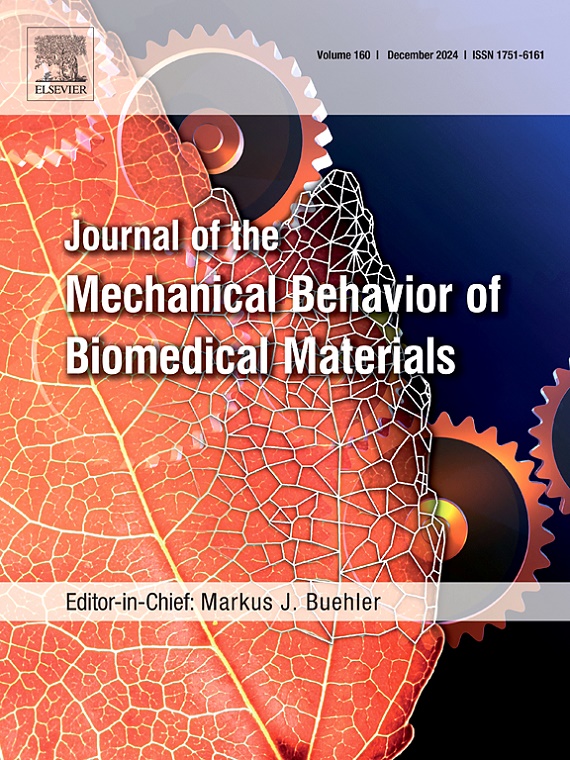Validation of a μ-volume sample holder for non-destructive and contactless assessment of the mechanical properties in soft biomaterials
IF 3.3
2区 医学
Q2 ENGINEERING, BIOMEDICAL
Journal of the Mechanical Behavior of Biomedical Materials
Pub Date : 2025-05-17
DOI:10.1016/j.jmbbm.2025.107066
引用次数: 0
Abstract
The mechanical characterization of soft biomaterials, like hydrogels, plays a key role for the successful development of new biomimetic constructs for numerous bioengineering and biomedical fields. Conventionally, mechanical properties are assessed using destructive approaches, including rheometer, which are weakly adapted to biomedical samples, mainly due to the lack of possibility to carry out in situ tests to follow gelation process. Recently, a non-destructive and contactless approach, named viscoelastic testing of bilayered materials (VeTBiM), was reported to measure the viscoelastic properties of soft hydrogels using low amplitude vibration. However, the high volumes required to obtain reliable results is considered a drawback for those applications in regenerative medicine demanding rare, highly purified and high-cost biomolecules. In this work, a new μ-volume sample holder is presented as cost-effective and time-efficient tool for the assessment of the mechanical properties of biomolecules-rich gels involving complex and time-consuming preparation. The new sample holder has been validated by comparing the data obtained on various gelatin and Pluronic F-127 hydrogels with the data from the conventional rotational rheometer. The results show the potential of the new sample holder in the characterization of viscoelastic materials through a contactless approach. Furthermore, this study contributes to confirm the versatility of VeTBiM for the future development of soft hydrogels for tissue engineering and regenerative medicine applications.
用于软质生物材料力学性能无损非接触评价的μ体积样品夹的验证
软质生物材料(如水凝胶)的力学特性对许多生物工程和生物医学领域的新型仿生结构的成功开发起着关键作用。传统上,机械性能是使用破坏性方法评估的,包括流变仪,这对生物医学样品的适应性较弱,主要是因为缺乏进行原位测试以跟踪凝胶过程的可能性。最近,一种非破坏性和非接触的方法,称为双层材料粘弹性测试(VeTBiM),被报道使用低振幅振动来测量软水凝胶的粘弹性特性。然而,对于那些需要稀有、高纯度和高成本生物分子的再生医学应用来说,获得可靠结果所需的大量被认为是一个缺点。在这项工作中,一种新的μ体积样品夹提出了一种经济高效的工具,用于评估复杂且耗时的生物分子富凝胶的力学性能。通过将各种明胶和Pluronic F-127水凝胶的数据与传统旋转流变仪的数据进行比较,验证了新的样品夹。结果表明,新型样品夹在粘弹性材料的非接触表征中具有很大的潜力。此外,该研究有助于证实VeTBiM的多功能性,为未来开发用于组织工程和再生医学的软水凝胶奠定基础。
本文章由计算机程序翻译,如有差异,请以英文原文为准。
求助全文
约1分钟内获得全文
求助全文
来源期刊

Journal of the Mechanical Behavior of Biomedical Materials
工程技术-材料科学:生物材料
CiteScore
7.20
自引率
7.70%
发文量
505
审稿时长
46 days
期刊介绍:
The Journal of the Mechanical Behavior of Biomedical Materials is concerned with the mechanical deformation, damage and failure under applied forces, of biological material (at the tissue, cellular and molecular levels) and of biomaterials, i.e. those materials which are designed to mimic or replace biological materials.
The primary focus of the journal is the synthesis of materials science, biology, and medical and dental science. Reports of fundamental scientific investigations are welcome, as are articles concerned with the practical application of materials in medical devices. Both experimental and theoretical work is of interest; theoretical papers will normally include comparison of predictions with experimental data, though we recognize that this may not always be appropriate. The journal also publishes technical notes concerned with emerging experimental or theoretical techniques, letters to the editor and, by invitation, review articles and papers describing existing techniques for the benefit of an interdisciplinary readership.
 求助内容:
求助内容: 应助结果提醒方式:
应助结果提醒方式:


